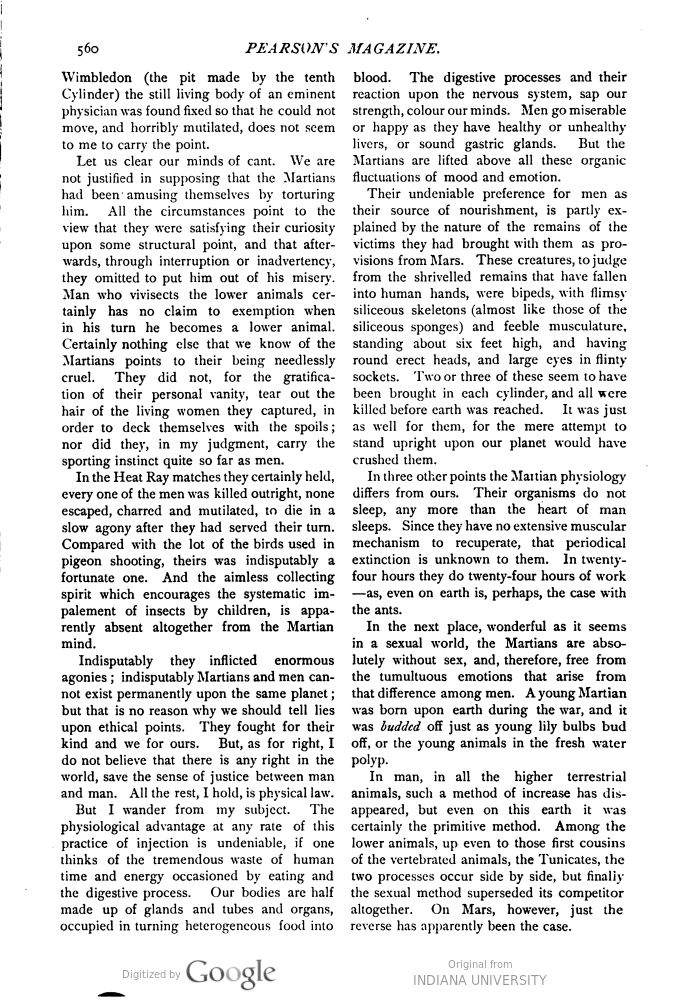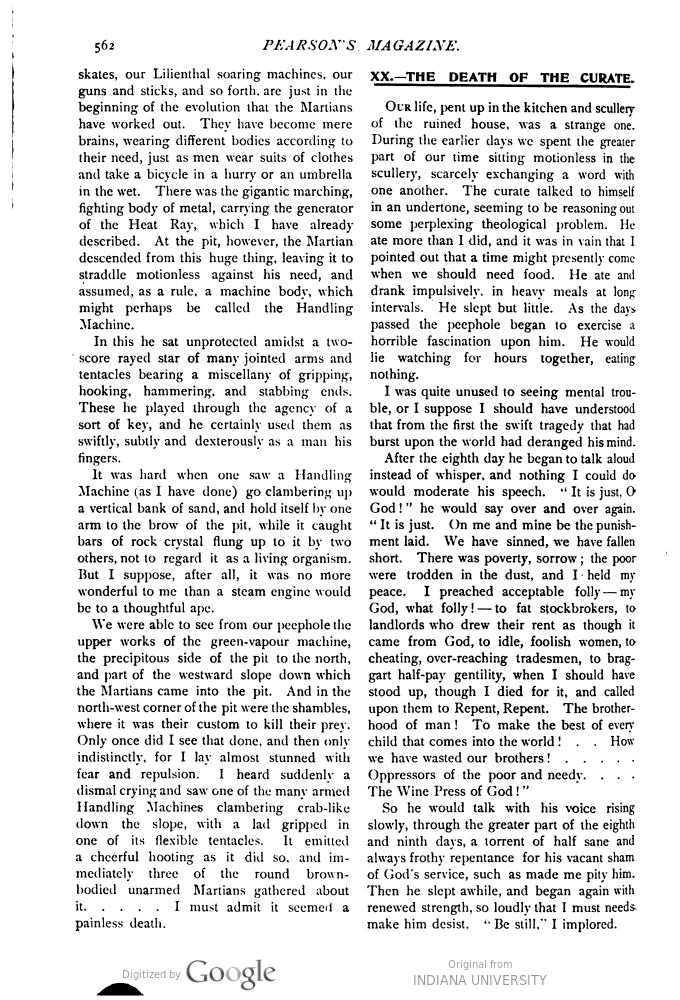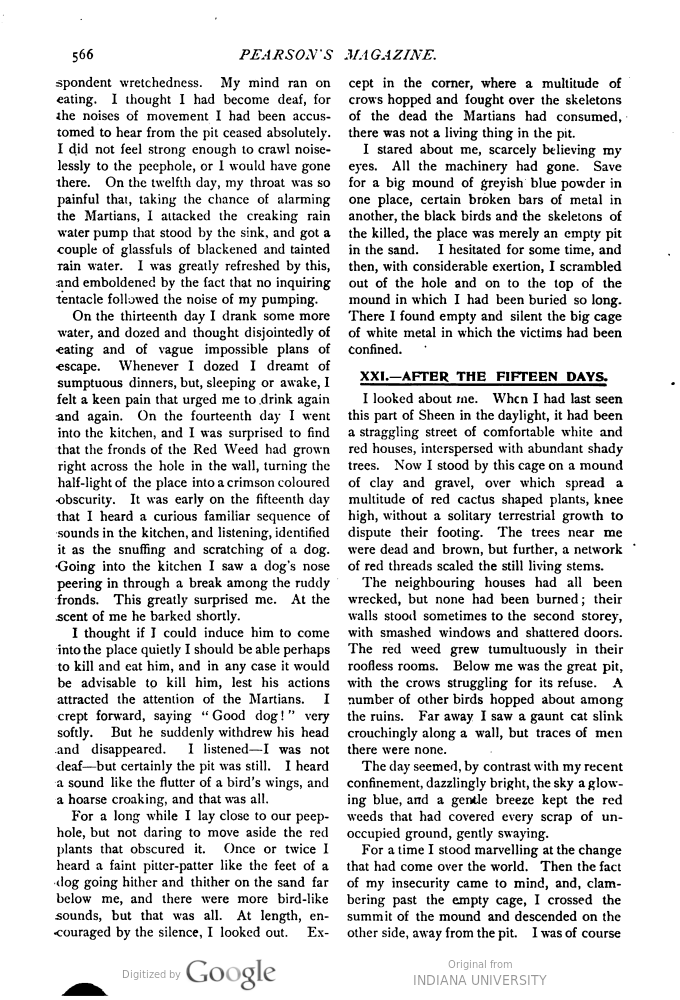Note: This page has been annotated with critical, historical, and cultural notes using the web annotation tool Hypothesis. You may view these annotations in the sidebar on the right-hand side of this page. Use the arrow icon to minimize the sidebar. A text-to-speech compatible transcript of the annotations for this page is available here.
The War of the Worlds in Pearson’s Magazine
Installment 8 of 9 (November 1897)
Pages from Pearson’s Magazine courtesy of HathiTrust, digitized by Google from originals at Indiana University.
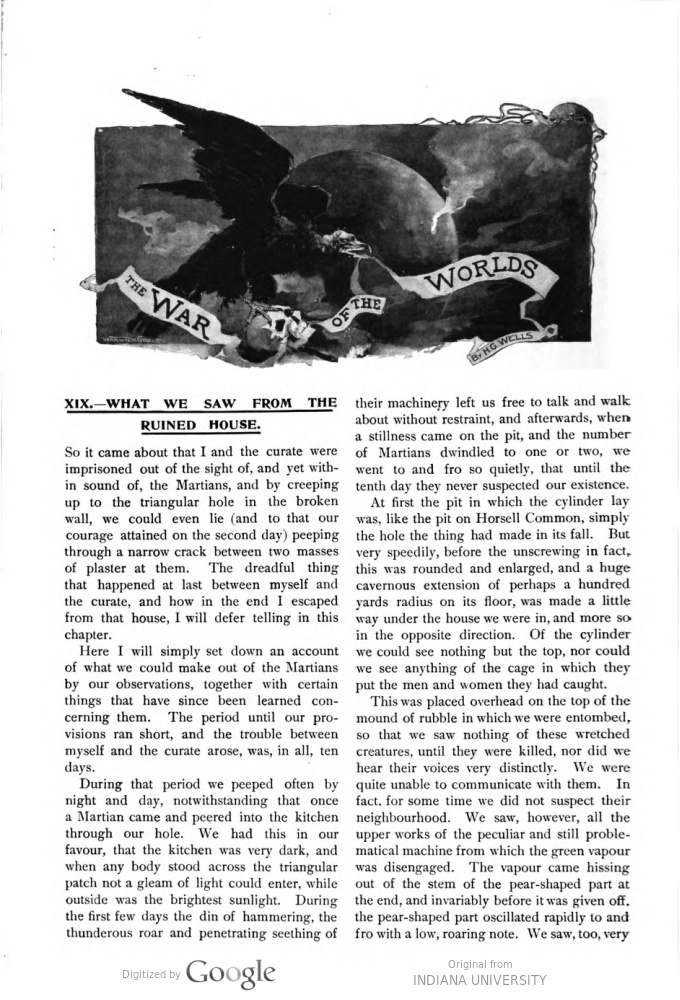
[text marker: start page 558]
THE WAR OF THE WORLDS
BY H. G. WELLS
XIX.—WHAT WE SAW FROM THE RUINED HOUSE.
So it came about that I and the curate were imprisoned out of the sight of, and yet within sound of, the Martians, and by creeping up to the triangular hole in the broken wall, we could even lie (and to that our courage attained on the second day) peeping through a narrow crack between two masses of plaster at them. The dreadful thing that happened at last between myself and the curate, and how in the end I escaped from that house, I will defer telling in this chapter.
Here I will simply set down an account of what we could make out of the Martians by our observations, together with certain things that have since been learned concerning them. The period until our provisions ran short, and the trouble between myself and the curate arose, was, in all, ten days.
During that period we peeped often by night and day, notwithstanding that once a Martian came and peered into the kitchen through our hole. We had this in our favour, that the kitchen was very dark, and when any body stood across the triangular patch not a gleam of light could enter, while outside was the brightest sunlight. During the first few days the din of hammering, the thunderous roar and penetrating seething of their machinery left us free to talk and walk about without restraint, and afterwards, when a stillness came on the pit, and a number of Martians dwindled to one or two, we went to and fro quietly, that until the tenth day they never suspected our existence.
At first the pit in which the cylinder lay was, like the pit on Horsell Common, simply the hole the thing had made in its fall. But very speedily, before the unscrewing in fact, this was rounded and enlarged, and a huge cavernous extension of perhaps a hundred yards radius on its floor, was made a little way under the house we were in, and more so in the opposite direction. Of the cylinder we could see nothing but the top, nor could we see anything of the cage in which they put the men and women they had caught.
This was placed overhead on the top of the mound of rubble in which we were entombed, so that we saw nothing of these wretched creatures, until they were killed, nor did we hear their voices very distinctly. We were quite unable to communicate with them. In fact, for some time we did not suspect their neighbourhood. We saw, however, all the upper works of the peculiar and still problematical machine from which the green vapour was disengaged. The vapour came hissing out of the stem of the pear-shaped part at the end, and invariably before it was given off, the pear-shaped part oscillated rapidly to and fro with a low, roaring note. We saw, too, very [text marker: end page 558]
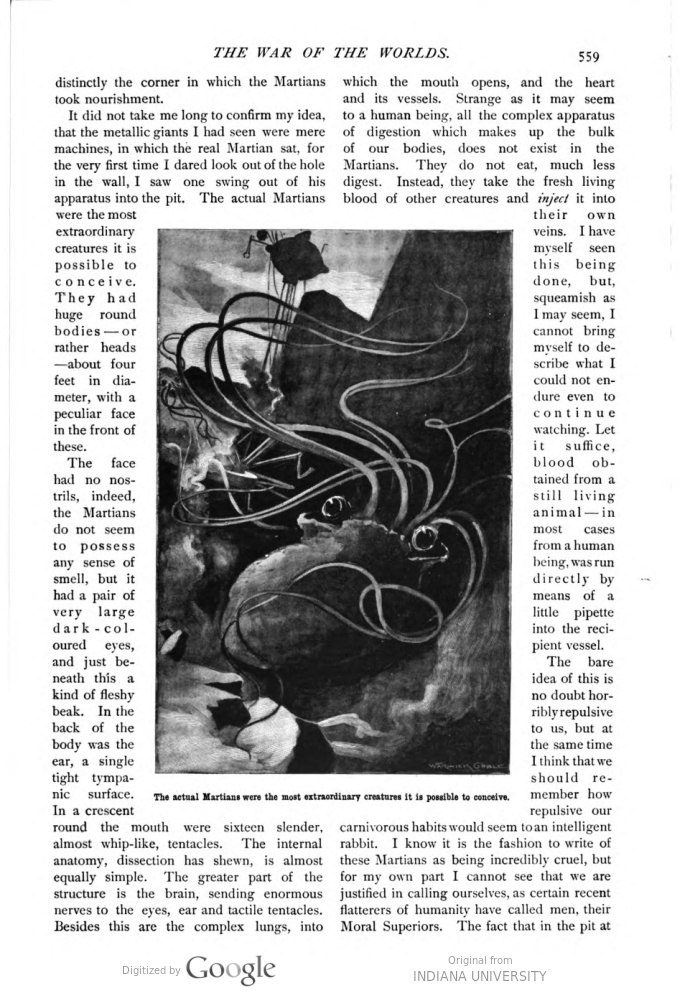
[text marker: start page 559] distinctly the corner in which the Martians took nourishment.
It did not take me long to confirm my idea, that the metallic giants I had seen were mere machines, in which the real Martian sat, for the very first time I dared look out of the hole in the wall, I saw one swing out of his apparatus into the pit. The actual Martians were the most extraordinary creatures it is possible to conceive. They had huge round bodies—or rather heads—about four feet in diameter, with a peculiar face in the front of these.
This face had no nostrils, indeed, the Martians do not seem to possess any sense of smell, but it had a pair of very large dark-coloured eyes, and just beneath this a kind of fleshy beak. In the back of the body was the ear, a single tight tympanic surface. In a crescent round the mouth were sixteen slender, almost whip-like, tentacles. The internal anatomy, dissection has shewn, is almost equally simple. The greater part of the structure is the brain, sending enormous nerves to the eyes, ear and tentacles. Besides this are the complex lungs, into which the mouth opens, and the heart and its vessels. Strange as it may seem to a human being, all the complex apparatus of digestion which makes up the bulk of our bodies, does not exist in the Martians. They do not eat, much less digest. Instead, they take the fresh living blood of other creatures and inject it into their own veins. I have myself seen this being done, but, squeamish as I may seem, I cannot bring myself to describe what I could not endure even to continue watching. Let it suffice, blood obtained from a still living animal―in most cases from a human being, was run directly by means of a little pipette into the recipient vessel.
The bare idea of this is no doubt horribly repulsive to us, but at the same time I think that we should remember how repulsive our carnivorous habits would seem to an intelligent rabbit. I know it is the fashion to write of these Martians as being incredibly cruel, but for my own part I cannot see that we are justified in calling ourselves, as certain recent flatterers of humanity have called men, their Moral Superiors. The fact that in the pit at [text marker: end page 559]
[text marker: start page 560] Wimbledon (the pit made by the tenth Cylinder) the still living body of an eminent physician was found fixed so that he could not move, and horribly mutilated, does not seem to me to carry the point.
Let us clear our minds of cant. We are not justified in supposing that the Martians had been amusing themselves by torturing him. All the circumstances point to the view that they were satisfying their curiosity upon some structural point, and that afterwards, through interruption or inadvertency, they omitted to put him out of his misery. Man who vivisects the lower animals certainly has no claim to exemption when in his turn he becomes a lower animal. Certainly nothing else that we know of the Martians points to their being needlessly cruel. They did not, for the gratification of their personal vanity, tear out the hair of the living women they captured, in order to deck themselves with the spoils; nor did they, in my judgment, carry the sporting instinct quite so far as men.
In the Heat Ray matches they certainly held, every one of the men was killed outright, none escaped, charred and mutilated, to die in a slow agony after they had served their turn. Compared with the lot of the birds used in pigeon shooting, theirs was indisputably a fortunate one. And the aimless collecting spirit which encourages the systematic impalement of insects by children, is apparently absent altogether from the Martian mind.
Indisputably they inflicted enormous agonies; indisputably Martians and men cannot exist permanently upon the same planet; but that is no reason why we should tell lies upon ethical points. They fought for their kind and we for ours. But, as for right, I do not believe that there is any right in the world, save the sense of justice between man and man. All the rest, I hold, is physical law.
But I wander from my subject. The physiological advantage at any rate of this practice of injection is undeniable, if one thinks of the tremendous waste of human time and energy occasioned by eating and the digestive process. Our bodies are half made up of glands and tubes and organs, occupied in turning heterogeneous food into blood. The digestive processes and their reaction upon the nervous system, sap our strength, colour our minds. Men go miserable or happy as they have healthy or unhealthy livers, or sound gastric glands. But the Martians were lifted above all these organic fluctuations of mood and emotion.
Their undeniable preference for men as their source of nourishment, is partly explained by the nature of the remains of the victims they had brought with them as provisions from Mars. These creatures, to judge from the shrivelled remains that have fallen into human hands, were bipeds, with flimsy silicious skeletons (almost like those of the silicious sponges) and feeble musculature, standing about six feet high, and having round erect heads, and large eyes in flinty sockets. Two or three of these seem to have been brought in each cylinder, and all were killed before earth was reached. It was just as well for them, for the mere attempt to stand upright upon our planet would have crushed them.
In three other points the Martian physiology differs from ours. Their organisms do not sleep, any more than the heart of man sleeps. Since they have no extensive muscular mechanism to recuperate, that periodical extinction is unknown to them. In twenty-four hours they do twenty-four hours of work―as, even on earth is, perhaps, the case with the ants.
In the next place, wonderful as it seems in a sexual world, the Martians are absolutely without sex, and, therefore, free from the tumultuous emotions that arise from that difference among men. A young Martian was born upon earth during the war, and it was budded off just as young lily bulbs bud off, or the young animals in the fresh water polyp.
In man, in all the higher terrestrial animals, such a method of increase has disappeared, but even on this earth it was certainly the primitive method. Among the lower animals, up even to those first cousins of the vertebrated animals, the Tunicates, the two processes occur side by side, but finally the sexual method superseded its competitor altogether. On Mars, however, just the reverse has apparently been the case. [text marker: end page 560]
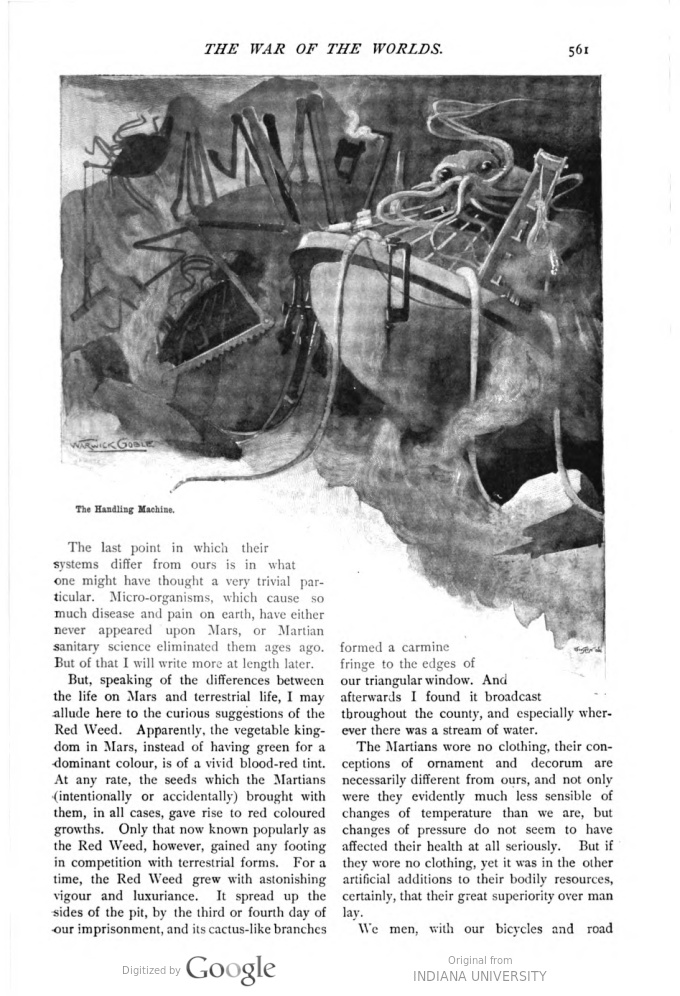
[text marker: start page 561] The last point in which their systems differ from ours is in what one might have thought a very trivial particular. Micro-organisms, which cause so much disease and pain on earth, have either never appeared upon Mars, or Martian sanitary science eliminated them ages ago. But of that I will write more at length later.
But, speaking of the differences between the life on Mars and terrestrial life, I may allude here to the curious suggestions of the Red Weed. Apparently, the vegetable kingdom in Mars, instead of having green for a dominant colour, is of a vivid blood-red tint. At any rate, the seeds which the Martians (intentionally or accidentally) brought with them, in all cases, gave rise to red coloured growths. Only that now known popularly as the Red Weed, however, gained any footing in competition with terrestrial forms. For a time, the Red Weed grew with astonishing vigour and luxuriance. It spread up the sides of the pit, by the third or fourth day of our imprisonment, and its cactus-like branches formed a carmine fringe to the edges of our triangular window. And afterwards I found it broadcast throughout the country, and especially wherever there was a stream of water.
The Martians wore no clothing, their conceptions of ornament and decorum are necessarily different from ours, and not only were they evidently much less sensible of changes of temperature than we are, but changes of pressure do not seem to have affected their health at all seriously. But if they wore no clothing, yet it was in the other artificial additions to their bodily resources, certainly, that their great superiority over man lay.
We men, with our bicycles and road [text marker: end page 561]
[text marker: start page 562] skates, our Lilienthal soaring machines, our guns and sticks, and so forth, are just in the beginning of the evolution that the Martians have worked out. They have become mere brains, wearing different bodies according to their need, just as men wear suits of clothes and take a bicycle in a hurry or an umbrella in the wet. There was the gigantic marching, fighting body of metal, carrying the generator of the Heat Ray, which I have already described. At the pit, however, the Martian descend from this huge thing, leaving it to straddle motionless against his need, and assumed, as a rule, a machine body, which might perhaps be called the Handling Machine.
In this he sat unprotected amidst a two-score rayed star of many jointed arms and tentacles bearing a miscellany of gripping, hooking, hammering, and stabbing ends. These he played through the agency of a sort of key, and he certainly used them as swiftly, subtly and dexterously as a man his fingers.
It was hard when one saw a Handling Machine (as I have done) go clambering up a vertical bank of sand, and hold itself by one arm to the brow of the pit, while it caught bars of rock crystal flung up to it by two others, not to regard it as a living organism. But I suppose, after all, it was no more wonderful to me than a steam engine would be to a thoughtful ape.
We were able to see from our peephole the upper works of the green-vapour machine, the precipitous side of the pit to the north, and part of the westward slope down which the Martians came into the pit. And in the north-west corner of the pit were the shambles, where it was their custom to kill their prey. Only once did I see that done, and then only indistinctly, for I lay almost stunned with fear and repulsion. I heard suddenly a dismal crying and saw one of the many armed Handling Machines clambering crab-like down the slope, with a lad gripped in one of its flexible tentacles. It emitted a cheerful hooting as it did so, and immediately three of the round brown-bodied unarmed Martians gathered about it. . . . . I must admit it seemed a painless death.
XX.—THE DEATH OF THE CURATE.
Our life, pent up in the kitchen and scullery of the ruined house, was a strange one. During the earlier days we spent the greater part of our time sitting motionless in the scullery, scarcely exchanging a word with one another. The curate talked to himself in an undertone, seeming to be reasoning out some perplexing theological problem. He ate more than I did, and it was in vain that I pointed out that a time might presently come when we should need food. He ate and drank impulsively, in heavy meals at long intervals. He slept but little. As the days passed the peephole began to exercise a horrible fascination upon him. He would lie watching for hours together, eating nothing.
I was quite unused to seeing mental trouble, or I suppose I should have understood that from the first the swift tragedy that had burst upon the world had deranged his mind.
After the eighth day he began to talk aloud instead of whisper, and nothing I could do would moderate his speech. “It is just, O God!” he would say over and over again. “It is just. On me and mine be the punishment laid. We have sinned, we have fallen short. There was poverty, sorrow; the poor were trodden in the dust, and I held my peace. I preached acceptable folly—my God, what folly!—to fat stockbrokers, to landlords who drew their rent as though it came from God, to idle, foolish women, to cheating, over-reaching tradesmen, to braggart half-pay gentility, when I should have stood up, though I died for it, and called upon them to Repent, Repent. The brotherhood of man! To make the best of every child that comes into the world! . . How we have wasted our brothers! . . . . . Oppressors of the poor and needy. . . . The Wine Press of God!”
So he would talk with his voice rising slowly, through the greater part of the eighth and ninth days, a torrent of half sane and always frothy repentance for his vacant sham of God’s service, such as made me pity him. Then he slept awhile, and began again with renewed strength, so loudly that I must needs make him desist. “Be still,” I implored. [text marker: end page 562]
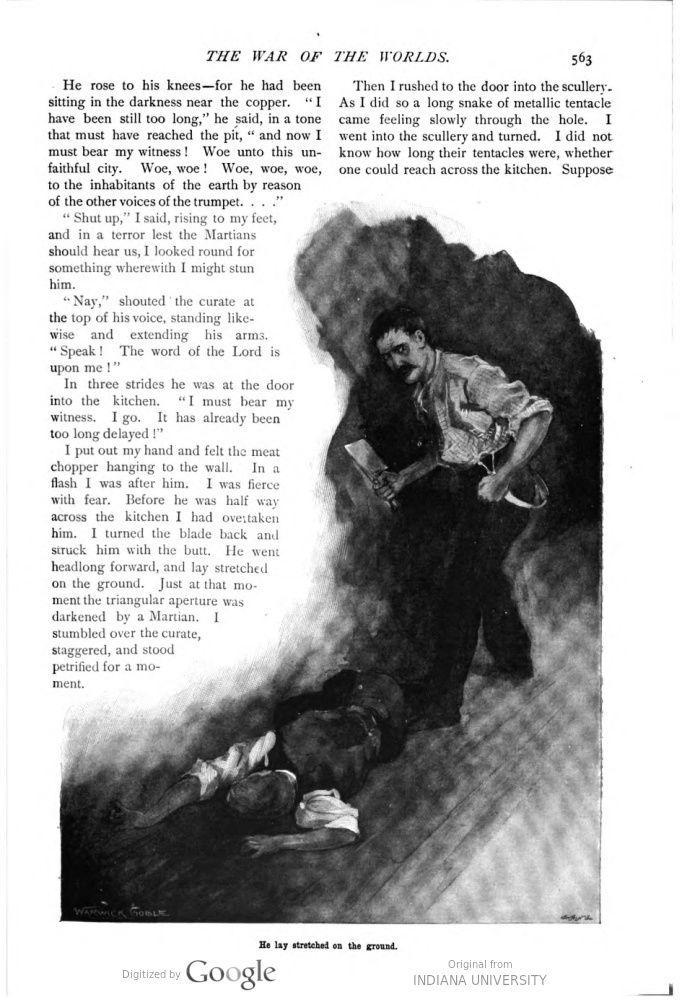
[text marker: start page 563] He rose to his knees—for he had been sitting in the darkness near the copper. “I have been still too long,” he said, in a tone that must have reached the pit, “and now I must bear my witness! Woe unto this unfaithful city. Woe, woe! Woe, woe, woe, to the inhabitants of the earth by reason of the other voices of the trumpet. . . .”
“Shut up,” I said, rising to my feet, and in a terror lest the Martians should hear us, I looked round for something wherewith I might stun him.
“Nay,” shouted the curate at the top of his voice, standing likewise and extending his arms. “Speak! The word of the Lord is upon me!”
In three strides he was at the door into the kitchen. “I must bear my witness! I go! It has already been too long delayed.”
I put out my hand and felt the meat chopper hanging to the wall. In a flash I was after him. I was fierce with fear. Before he was half way across the kitchen I had overtaken him. I turned the blade back and struck him with the butt. He went headlong forward, and lay stretched on the ground. Just at that moment the triangular aperture was darkened by a Martian. I stumbled over the curate, staggered, and stood petrified for a moment.
Then I rushed to the door in the scullery. As I did so a long snake of metallic tentacle came feeling slowly through the hole. I went into the scullery and turned. I did not know how long their tentacles were, whether one could reach across the kitchen. Suppose [text marker: end page 563]
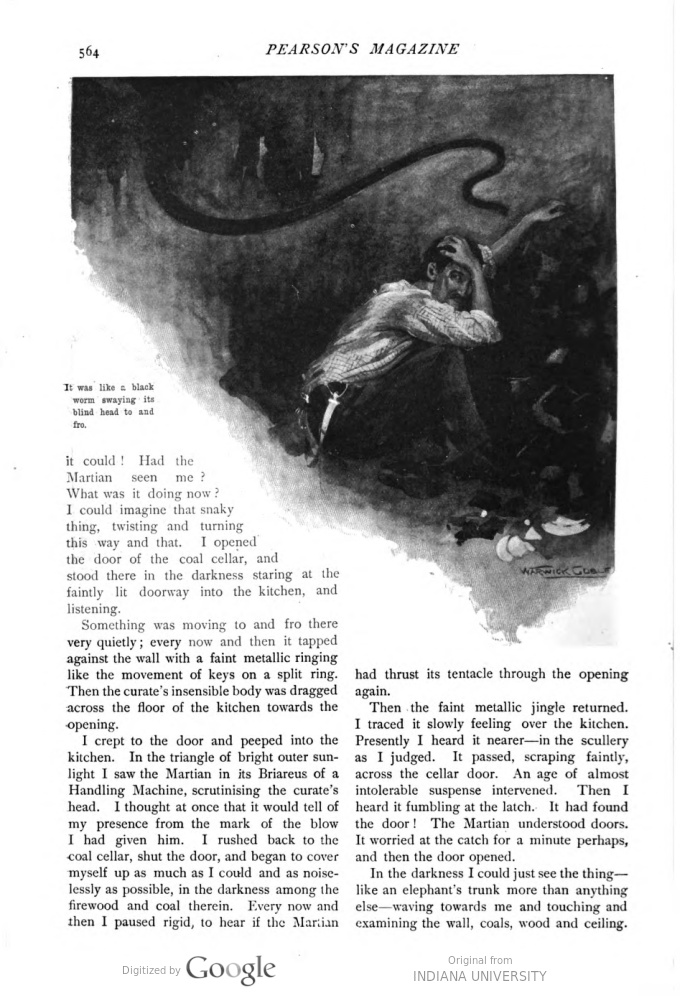
[text marker: start page 564] it could! Had the Martian seen me? What was it doing now? I could imagine that snaky thing, twisting and turning this way and that. I opened the door of the coal cellar, and stood there in the darkness staring at the faintly lit doorway into the kitchen, and listening.
Something was moving to and fro there very quietly; every now and then it tapped against the wall with a faint metallic ringing like the movements of keys on a split ring. Then the curate’s insensible body was dragged across the floor of the kitchen towards the opening.
I crept to the door and peeped into the kitchen. In the triangle of bright outer sunlight I saw the Martian in its Briareus of a Handling Machine, scrutinising the curate’s head. I thought at once that it would tell of my presence from the mark of the blow I had given him. I rushed back to the coal cellar, shut the door, and began to cover myself up as much as I could and as noiselessly as possible, in the darkness among the firewood and coal therein. Every now and then I paused rigid, to hear if the Martian had thrust its tentacle through the opening again.
Then the faint metallic jingle returned. I traced it slowly feeling over the kitchen. Presently I heard it nearer—in the scullery as I judged. It passed, scraping faintly, across the cellar door. An age of almost intolerable suspense intervened. Then I heard it fumbling at the latch. It had found the door! The Martian understood doors. It worried at the catch for a minute perhaps, and then the door opened.
In the darkness I could just see the thing—like an elephant’s trunk more than anything else—waving towards me and touching and examining the wall, coals, wood and ceiling. [text marker: end page 564]

[text marker: start page 565] It was like a black worm swaying its blind head to and fro. Once even it touched my boot. At any moment the blind filament might discover me. I was on the verge of screaming―I bit my hand. For a time it was silent. I could have fancied it had been withdrawn. Presently with an abrupt click it gripped something—I thought it had me!—and seemed to go out of the cellar again. For a minute I was not sure. Apparently it had taken a lump of coal to examine.
I seized the opportunity of slightly shifting my position, which had become cramped, and listened. I whispered passionate prayers for safety. Then I heard the slow deliberate sound creeping towards me again. Slowly, slowly it drew near, scratching against walls and tapping furniture. While I was still doubtful it rapped suddenly against the cellar door. I heard it go into the pantry, and the biscuit tins rattled and a bottle smashed, and then came a heavy bump against the cellar door. Then silence, that passed into an infinity of suspense. Had it gone? At last I decided that it had.
It came into the scullery no more. But I lay all the tenth day, in the close darkness, buried among coals and firewood, not daring even to crawl out for the drink for which I craved. It was the eleventh day before I ventured so far from my security. My first act, before I went into the pantry, was to fasten the door between kitchen and scullery. But the pantry was empty; every scrap of food had gone. Apparently the Martian had taken it all on the previous day. At that discovery I despaired for the first time.
I took no food and no drink either on the eleventh or the twelfth day. At first my mouth and throat were parched and my strength ebbed sensibly. I sat about in the darkness of the scullery, in a state of de-[text marker: end page 565 in the middle of the word “despondent”]
[text marker: start page 566 in the middle of the word “despondent”] spondent wretchedness. My mind ran on eating. I thought I had become deaf, for the noises of movement I had been accustomed to hear from the pit had ceased absolutely. I did not feel strong enough to crawl noiselessly to the peephole, or I would have gone there. On the twelfth day, my throat was so painful that, taking the chance of alarming the Martians, I attacked the creaking rain water pump that stood by the sink, and got a couple of glassfuls of blackened and tainted rain water. I was greatly refreshed by this, and emboldened by the fact that no inquiring tentacle followed the noise of my pumping.
On the thirteenth day I drank some more water, and dozed and thought disjointedly of eating and of vague impossible plans of escape. Whenever I dozed I dreamt of sumptuous dinners, but, sleeping or awake, I felt a keen pain that urged me to drink again and again. On the fourteenth day I went into the kitchen, and I was surprised to find that the fronds of the Red Weed had grown right across the hole in the wall, turning the half-light of the place into a crimson coloured obscurity. It was early on the fifteenth day that I heard a curious familiar sequence of sounds in the kitchen, and listening, identified it as the snuffing and scratching of a dog. Going into the kitchen I saw a dog’s nose peering in through a break among the ruddy fronds. This greatly surprised me. At the scent of me he barked shortly.
I thought if I could induce him to come into the place quietly I should be able perhaps to kill and eat him, and in any case it would be advisable to kill him, lest his actions attracted the attention of the Martians. I crept forward, saying “Good dog!” very softly. But he suddenly withdrew his head and disappeared. I listened—I was not deaf—but certainly the pit was still. I heard a sound like the flutter of a bird’s wings, and a hoarse croaking, and that was all.
For a long while I lay close to the peephole, but not daring to move aside the red plants that obscured it. Once or twice I heard a faint pitter-patter like the feet of the dog going hither and thither on the sand far below me, and there were more bird-like sounds, but that was all. At length, encouraged by the silence, I looked out. Except in the corner, where a multitude of crows hopped and fought over the skeletons of the dead the Martians had consumed, there was not a living thing in the pit.
I stared about me, scarcely believing my eyes. All the machinery had gone. Save for a big mound of greyish blue powder in one place, certain broken bars of metal in another, the black birds and the skeletons of the killed, the place was merely an empty pit in the sand. I hesitated for some time, and then, with considerable exertion, I scrambled out of the hole and on to the top of the mound in which I had been buried so long. There I found empty and silent the big cage of white metal in which the victims had been confined.
XXI.―AFTER THE FIFTEEN DAYS.
I looked about me. When I had last seen this part of Sheen in the daylight, it had been a straggling street of comfortable white and red houses, interspersed with abundant shady trees. Now I stood on a mound of clay and gravel, over which spread a multitude of red cactus shaped plants, knee high, without a solitary terrestrial growth to dispute their footing. The trees near me were dead and brown, but further, a network of red threads scaled the still living stems.
The neighbouring houses had all been wrecked, but none had been burned; their walls stood sometimes to the second storey, with smashed windows and shattered doors. The red weed grew tumultuously in their roofless rooms. Below me was the great pit, with the crows struggling for its refuse. A number of other birds hopped about among the ruins. Far away I saw a gaunt cat slink crouchingly along a wall, but traces of men there were none.
The day seemed, by contrast with my recent confinement, dazzlingly bright, the sky a glowing blue, and a gentle breeze kept the red weed that had covered every scrap of unoccupied ground, gently swaying.
For a time I stood marvelling at the change that had come over the world. Then the fact of my insecurity came to mind, and, clambering past the empty cage, I crossed the summit of the mound and descended on the other side, away from the pit. I was of course [text marker: end page 566]
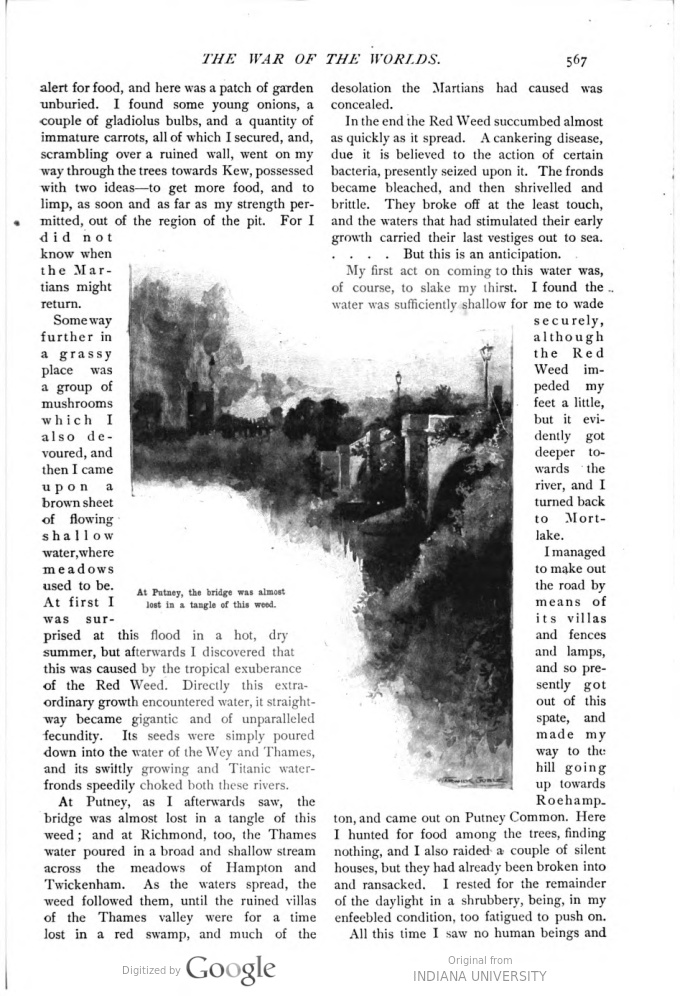
[text marker: start page 567] alert for food, and here was a patch of garden unburied. I found some young onions, a couple of gladiolus bulbs, and a quantity of immature carrots, all of which I secured, and, scrambling over a ruined wall, went on my way through the trees towards Kew, possessed with two ideas—to get more food, and to limp, as soon and as far as my strength permitted, out of the region of the pit. For I did not know when the Martians might return.
Some way further in a grassy place was a group of mushrooms which I also devoured, and then I came upon a brown sheet of flowing shallow water, where meadows used to be. At first I was surprised at this flood in a hot, dry summer, but afterwards I discovered that this was caused by the tropical exuberance of the Red Weed. Directly this extraordinary growth encountered water, it straightway became gigantic and of unparalleled fecundity. Its seeds were simply poured down into the water of the Wey and Thames, and its swiftly growing and Titanic water-fronds speedily choked both these rivers.
At Putney, as I afterwards saw, the bridge was almost lost in a tangle of this weed; and at Richmond, too, the Thames water poured in a broad and shallow stream across the meadows of Hampton and Twickenham. As the waters spread, the weed followed them, until the ruined villas of the Thames valley were for a time lost in a red swamp, and much of the desolation the Martians had caused was concealed.
In the end the Red Weed succumbed almost as quickly as it spread. A cankering disease, due it is believed to the action of certain bacteria, presently seized upon it. The fronds became bleached, and then shrivelled and brittle. They broke off at the least touch, and the waters that had stimulated their early growth carried their last vestiges out to sea. . . . . But this is an anticipation.
My first act on coming to this water was, of course, to slake my thirst. I found the water was sufficiently shallow for me to wade securely, although the Red Weed impeded my feet a little, but it evidently got deeper towards the river, and I turned back to Mortlake.
I managed to make out the road by means of its villas and fences and lamps, and so presently got out of this spate, and made my way to the hill going up towards Roehampton, and came out on Putney Common. Here I hunted for food among the trees, finding nothing, and I also raided a couple of silent houses, but they had already been broken into and ransacked. I rested for the remainder of the daylight in a shrubbery, being, in my enfeebled condition, too fatigued to push on.
All this time I saw no human beings and [text marker: end page 567]
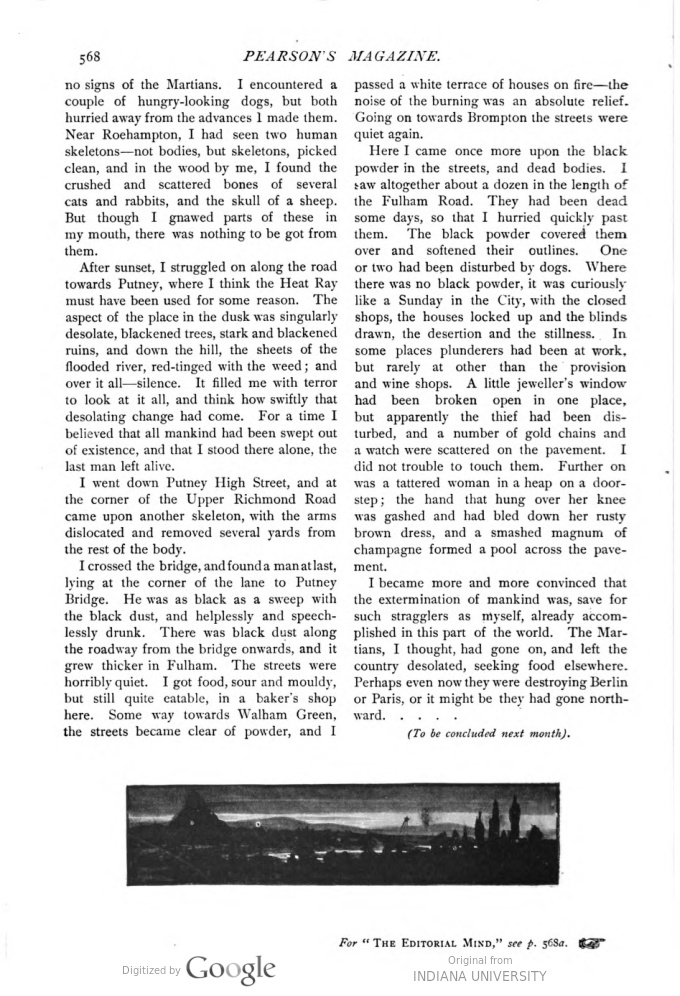
[text marker: start page 568] no signs of the Martians. I encountered a couple of hungry-looking dogs, but both hurried away from the advances I made them. Near Roehampton, I had seen two human skeletons—not bodies, but skeletons, picked clean, and in the wood by me, I found the crushed and scattered bones of several cats and rabbits, and the skull of a sheep. But though I gnawed parts of these in my mouth, there was nothing to be got from them.
After sunset, I struggled on along the road towards Putney, where I think the Heat Ray must have been used for some reason. The aspect of the place in the dusk was singularly desolate, blackened trees, stark and blackened ruins, and down the hill, the sheets of the flooded river, red-tinged with the weed; and over it all—silence. It filled me with terror to look at it all, and think how swiftly that desolating change had come. For a time I believed that all mankind had been swept out of existence, and that I stood there alone, the last man left alive.
I went down Putney High Street, and at the corner of Upper Richmond Road came upon another skeleton, with the arms dislocated and removed several yards from the rest of the body.
I crossed the bridge, and found a man at last, lying at the corner of the lane to Putney Bridge. He was as black as a sweep with the black dust, and helplessly and speechlessly drunk. There was black dust along the roadway from the bridge onwards, and it grew thicker in Fulham. The streets were horribly quiet. I got food, sour and mouldy, but still quite eatable, in a baker’s shop here. Some way towards Walham Green, the streets became clear of powder, and I passed a white terrace of houses on fire―the noise of the burning was an absolute relief. Going on towards Brompton the streets were quiet again.
Here I came once more upon the black powder in the streets, and dead bodies. I saw altogether about a dozen in the length of the Fulham Road. They had been dead some days, so that I hurried quickly past them. The black powder covered them over and softened their outlines. One or two had been disturbed by dogs. Where there was no black powder, it was curiously like a Sunday in the City, with the closed shops, the houses locked up and the blinds drawn, the desertion and the stillness. In some places plunderers had been at work, but rarely at other than the provision and wine shops. A little jeweller’s window had been broken open in one place, but apparently the thief had been disturbed, and a number of gold chains and a watch were scattered on the pavement. I did not trouble to touch them. Further on was a tattered woman in a heap on a doorstep; the hand that hung over her knee was gashed and had bled down her rusty brown dress, and a smashed magnum of champagne formed a pool across the pavement.
I became more and more convinced that the extermination of mankind was, save for such stragglers as myself, already accomplished in this part of the world. The Martians, I thought, had gone on, and left the country desolated, seeking food elsewhere. Perhaps even now they were destroying Berlin or Paris, or it might be they had gone northward. . . . .
(To be concluded next month).
[text marker: end page 568, end installment 8]

